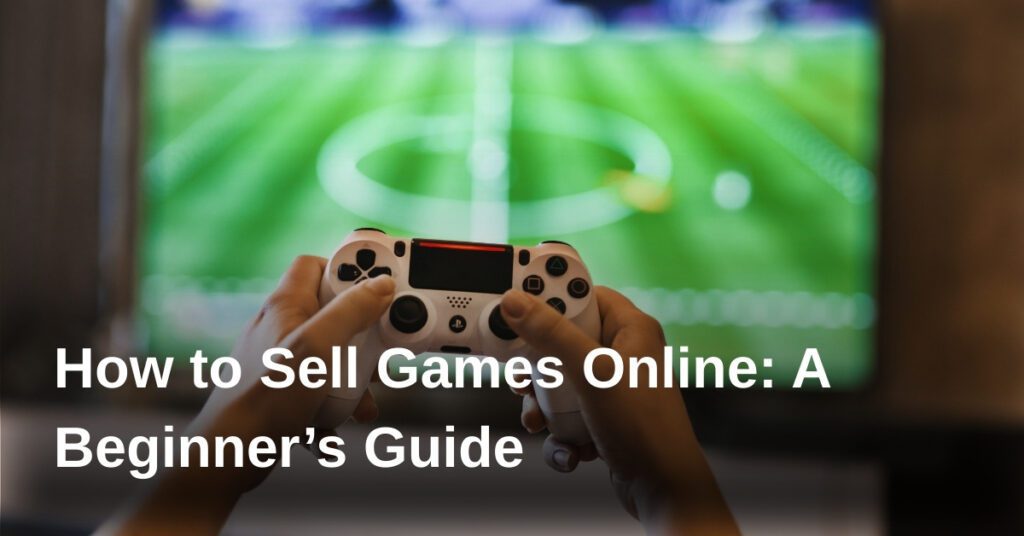
For many, the excitement of playing hits like Minecraft, Grand Theft Auto V, or even retro classics such as Tetris goes hand in hand with the desire to share these experiences with others. If you have a collection of old favourites or new unopened titles lying around, it might be the perfect time to Sell games online. Navigating this process can seem daunting at first, especially with so many platforms, rules, and price points to consider. However, understanding your options and learning a few trade secrets can simplify your journey. In my opinion, whether you’re selling to clear space, fund your next purchase, or simply help someone discover the joys of gaming, unlocking the basics is the first step towards a successful experience.
Main Points
- Platform selection: Learn how to choose the right online marketplace based on your game type, target audience, and seller fees.
- Game preparation: Discover why cleaning, testing, and photographing your games increases buyer trust and can lead to faster sales.
- Pricing strategies: Understand how to research your game’s value, set competitive prices, and spot trends that could drive demand.
- Listing optimisation: Master the art of writing accurate, engaging descriptions to attract the right buyers and prevent disputes.
- Safety and transactions: Get tips on protecting yourself during payment and shipping, ensuring smooth and secure exchanges with buyers.
Understanding the Online Game Market: Trends and Opportunities
The online game market has evolved rapidly, creating both exciting prospects and complex challenges for developers and publishers alike. Recent years have shown fluctuating trends, but some constants remain. For example, the best selling games of all time generally tap into universal themes and social play, although emerging niches sometimes defy predictions. Today’s gamers seek immersive experiences, but they also value quick, accessible fun. Accordingly, the formula for success isn’t set in stone; it often involves experimentation and adapting to fast-changing preferences.
- Innovation: Devs who Sell games with unique mechanics often stand out.
- Community: Sell games that foster online interaction can drive loyalty.
- Monetization: Effective ways to Sell games might include offers, expansions, or free-to-play options.
Despite challenges, the market still rewards those who track trends closely and respond creatively. After all, the story behind every blockbuster is surprisingly nuanced and ever-changing.
You Can Also Review These:
The Beginner’s Guide to Selling Game Art Assets Online – Part 1
Choosing the Right Platform to Sell Your Games
Selecting the ideal platform to sell games is not always a straightforward decision. Each marketplace offers unique advantages and potential drawbacks, which may influence your success. For instance, some platforms provide robust marketing tools, making it easier to sell games to a broader audience. However, these same platforms may also charge higher commissions. Meanwhile, niche platforms could offer less competition yet attract a smaller user base. Additionally, payment processing options and customer support quality may vary, directly impacting your ability to sell games efficiently. Therefore, it’s worth considering the visibility of your titles and the alignment of a platform’s audience with your game’s genre or style. In my opinion, taking the time to compare features, fees, and community engagement is crucial. Making an informed platform choice can make all the difference, even if the “perfect” answer isn’t always obvious at first glance.
Essential Steps for Setting Up Your Online Game Store
To sell games successfully online, it’s crucial to build a solid foundation for your digital store. First, research your target audience to understand what influences their preferences and spending habits. Then, select a reliable e-commerce platform that supports sell games transactions, because not all solutions offer efficient payment and digital delivery options. Site structure plays a role too; design clear navigation and effective product categories for easy browsing. However, pricing can be tricky—competitors may shift their offers without warning, so stay adaptable. Additionally, ensure secure payment gateways to instill confidence in buyers. Despite this, your game descriptions and visuals should always be accurate, yet approachable, reflecting the excitement of each title. Don’t overlook customer support; timely assistance might just make the difference. In my opinion, regular updates and promotional campaigns help your store stand out and consistently sell games to both new and returning players.
Crafting Compelling Game Listings That Convert
When you aim to Sell games successfully online, the distinction between mediocre and compelling listings becomes crucial. Although there’s no single formula, a thoughtful approach often makes a difference. Begin by offering clear, high-quality visuals—buyers tend to trust listings that show every angle, as this indicates transparency. Next, craft descriptions that balance excitement with accuracy. Rather than merely listing features, try to convey the actual in-game experience, as this helps potential buyers imagine themselves playing.
Importantly, strong listings address common concerns. Mentioning the condition, compatibility, or unique bonuses can reassure undecided buyers. In my opinion, a list like the one below guides your listing process, hence enhancing effectiveness:
- Title: precise and descriptive
- Sell games images: varied and clear
- Details: honest and concise
- Price: competitive, with reason if higher
Ultimately, genuine effort in your Sell games listings becomes evident and, surprisingly, often translates to better conversion rates.
Pricing Strategies for Maximising Your Game Sales
Selecting the right pricing strategy can significantly influence how well you sell games in a competitive market. Some studios find success with premium pricing, which may suggest higher quality, whereas others benefit from lower entry costs to attract a wider audience. Dynamic pricing, where you adjust the cost over time or through seasonal sales, is another approach that often helps studios sell games to consumers who might be waiting for discounts. Bundling your titles with related products or offering exclusive content can also foster increased engagement. However, it’s challenging to determine a single perfect method, as player preferences and regional expectations vary. Therefore, conducting market research and analysing player feedback is essential. In the end, flexible strategies and a keen eye on shifting trends will place you in a stronger position to sell games consistently over time without alienating your core audience.
Marketing and Promoting Your Games Online Effectively
Reaching players online demands more than simply uploading your creations. To sell games and build a steady audience, focus on crafting a recognisable brand identity. Social media platforms can make a significant difference, yet results don’t always appear immediately. Consider engaging your audience through live streams, behind-the-scenes content, or community polls to encourage active participation. Additionally, clear communication about your game’s features or updates keeps expectations realistic, which proves crucial in the long run. Therefore, exploring paid advertisements or influencer partnerships may increase visibility, but not everyone sees instant returns from these options.
“Consistent, genuine interaction often matters as much as technical polish when striving to sell games online.”
While there’s some debate about the best frequency for posts or updates, staying responsive and approachable tends to leave a positive impression. Ultimately, to successfully sell games effectively, monitor your strategies closely and adapt according to what your community values most.
Managing Customer Service and Building Trust with Buyers
Providing excellent customer service is key when you sell games online. Responsiveness and understanding can make a lasting impression, even if every interaction doesn’t go as planned. Addressing questions promptly, handling issues fairly, and protecting sensitive information help establish trust. It’s rarely enough to just offer sell games listings; buyers appreciate clear communication, transparency, and reliability.
Building trust often revolves around several important practices:
- Honesty: Describe sell games accurately to set expectations.
- Timely Replies: Quick responses show commitment.
- Fair Resolutions: Resolve disputes with respect and balance.
A warm approach and a willingness to assist can encourage customers to return. Nevertheless, some buyers might remain cautious until you prove your consistency over time. Accordingly, making every experience straightforward and pleasant enhances your reputation and sets you apart in a competitive marketplace.
Handling Payments and Secure Transactions
Managing Sell games finances can feel daunting at first, especially with so many options for handling payments. While many prefer widely recognized gateways, some may explore less common solutions depending on their market. Therefore, prioritizing Sell games security becomes essential. Using encrypted payment services helps protect sensitive data, but regular monitoring for unauthorized activity is equally critical. Additionally, offering a few trusted payment options usually reassures buyers, yet sometimes odd preferences might emerge based on region or platform. In my opinion, transparent refund policies and clear communication about transaction processes minimize disputes. Nevertheless, fees for certain methods may vary and can subtly impact your overall profit from Sell games ventures. Although complete guarantee of safety remains uncertain in digital commerce, proactive measures like two-factor authentication and periodic updates to your systems significantly lower risks. Adaptability and vigilance, then, are key as you build credibility and trust across all transactions.
Analysing Performance and Scaling Your Online Game Business
Understanding how your online game business performs is crucial for long-term success. Regularly tracking player engagement, retention rates, and revenue sources lets you fine-tune your Sell games strategy. However, performance trends are not always linear; some features that initially seem unpopular may later drive significant growth. When Sell games metrics show a spike or drop, it’s wise to investigate underlying causes—sometimes, market shifts or technical issues are at play. Scaling the business requires careful balancing of resources and ambitions. Invest in scalable infrastructure to ensure smooth user experiences, especially during unexpected traffic surges. Additionally, expand your marketing channels at a pace your team can sustain. Optimising your Sell games offers is key, yet you should continually adapt to evolving player preferences. Analysing performance, although sometimes ambiguous, provides insights that are essential for confident and responsive growth decisions.
Conclusion
Starting your journey to sell games online can feel daunting, especially if you’re new to the scene. However, by taking the time to understand your audience, selecting the right platforms, and presenting your games attractively, you set yourself up for success. Remember, patience pays off; building trust and delivering excellent service are just as important as the initial sale. In my opinion, anyone with a genuine passion for gaming and a willingness to learn can thrive in this space. Therefore, stay curious, keep improving, and soon you’ll find your own rewarding path in the world of game sales.
Related Articles:
How to Sell Audiobooks Online: A Beginner’s Guide
